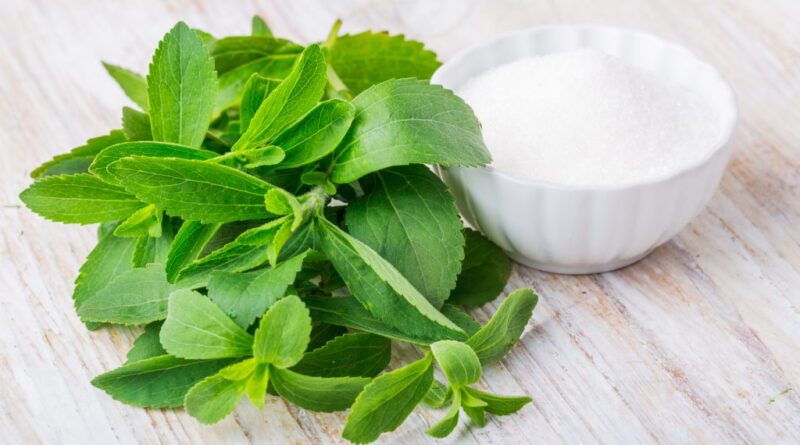Stevia And Belly Fat: Is This Sweetener Harmful?
Sugar Consumption, And Its Results
No matter if you have a sweet tooth, you like sweetened drinks, canned foods, sauces, or a number of other foods, you are consuming a pretty huge amount of sugar. Increased consumption of sugar may lead to such serious health issues as cardiovascular diseases, type 2 diabetes, and cancer. It’s consumption is also among the main causes of obesity. According to the World Health Organization, about 40% of people around the world are overweight, partly because of such a high sugar content in foods. As a result, lots of people try to switch to artificial sweeteners which are believed to be healthier. Yet this is not always the case. Let’s take, for instance, stevia. Although it is pretty low in calories and considered safe for health, there are some concerns about the link between stevia and belly fat. So, is it as harmful as people think, or can you consume it without any worries? Read on to find out!
Why You Should Reduce Your Sugar Intake?
There is a good reason why sugar is called a slow poison. Before diving into the main topic of this article, first, let’s find out why people use sweeteners at all, and why lots of sugar is so harmful to your body. Here are the main reasons why you should decrease your consumption of “the white death”:
· It causes blood sugar spikes
· It adds to the risk of chronic diseases (cardiovascular issues, diabetes, obesity)
· It interferes with immune function
· It promotes aging
· It causes tooth decay
· It takes the place of essential nutrients
· It promotes weight gain
As you can see, high sugar intake is very harmful to you and should be avoided. Here are the main forms of this dietary component:
What to avoid:
· Corn syrup
· Fruit juice concentrates
· Brown sugar
· Invert sugar
· Malt sugar
· Molasses
· Syrup sugar molecules ending in “-ose” (dextrose, fructose, glucose, lactose, maltose, sucrose)
Don’t know what is good and what is bad for weight loss? End the worrying, thinking, and planning, and download the BetterMe app. It has all you need and even more!
Contents And Effects Of Stevia
Now, back to the main topic of this article. Even if you have never used it, you probably know that stevia is a plant extract that is used as a sugar substitute due to its sweetness. Research shows that it contains 8 glycosides: stevioside, steviolbioside, dulcoside A, and rebaudioside A, B, C, D, E, and F.
When it comes to the effects of stevia, the research shows different results. For example, a 2017 article states that it may aid in the treatment of endocrine diseases, hypertension, diabetes, and obesity, while a single study in 2018 showed that some low-calorie sweeteners may increase fat in the human body. So, let’s take a look at both the positive and negative effects of stevia.
Positive Effects
Some of the main possible benefits and pros of this sweetener include the following:
· Can be safely consumed by patients with diabetes. It doesn’t affect insulin or blood glucose response.
· May help people with high blood pressure. Research shows that it has the potential of lowering blood pressure.
· May aid in weight management. It is low in calories and is a life-saver for people with a sweet tooth who are trying to slim down.
· Doesn’t trigger allergic reactions.
Negative Effects
Now, before concluding that stevia is completely harmless, take a look at the possible risks that stevia its consumption poses:
· May interfere with hormone production.
· May have a negative impact on people with low blood pressure. May lower their blood pressure even more.
· Reduces blood sugar.
· Causes gastrointestinal issues.
Does Stevia Consumption Add To Belly Fat?
Before answering this question, let’s figure out what are the main causes of belly fat. Here are some of them
· Unhealthy dietary choices. Increased consumption of unhealthy fats, refined carbs, and added sugars may lead to weight gain and increased belly size.
· Lack of physical exercise. Lack of exercise promotes caloric surplus, which may lead to fat depositions in the abdominal area.
· Increased alcohol consumption. Drinking a lot of alcohol may promote belly growth.
· High levels of stress. Increased stress levels increase emotional eating and overeating which lead to belly fat.
· Lack of proper sleep. Sleep deprivation may lead to weight gain, which is accompanied by an increased amount of belly fat.
Get rid of that protruding belly with the help of the BetterMe app. It can provide you with a personalized diet plan and a customized workout routine. You can also find numerous exercises with explanations, thousands of recipes, water, and walking tracker, and other convenient features.
Now, back to answering the main question of this article. This sweetener is low in calories and carbs and may be beneficial for the weight loss process, since it may be used to replace sugar intake of about 45 calories for each tablespoon. Even so, due to its sweetness, it possibly can cause an insulin response. Although there are no sufficient human studies to prove that stevia adds to belly fat, a 2008 study on chickens showed that it significantly increased abdominal fat content. However, to be certain on that matter, more research is needed.
DISCLAIMER:
This article is intended for general informational purposes only and does not address individual circumstances. It is not a substitute for professional advice or help and should not be relied on to make decisions of any kind. Any action you take upon the information presented in this article is strictly at your own risk and responsibility!




